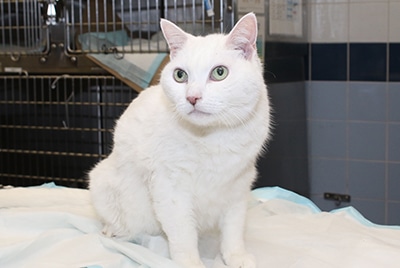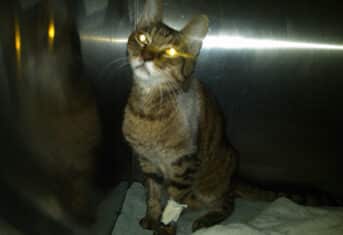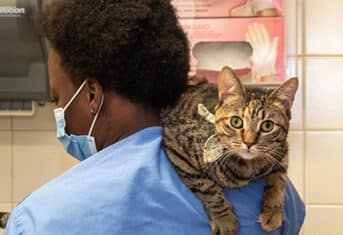My Cat is Older, What Special Care is Required?

My Cat is Older, What Special Care is Required?
June is Adopt a Shelter Cat Month and we’re highlighting our feline friends throughout the month through a series of feline-focused posts. Last week, I wrote about why your cat looks like a devil when you take her photo using a flash. This week, I am discussing the care of senior cats since there are many wonderful older cats in shelters needing a fur-ever home.
Annual Examinations are Critical for Aging Cats
The American Animal Hospital Association – American Association of Feline Practitioners Lifestage guidelines recommend an annual veterinary visit for mature cats (7-10 years of age) and twice annual visits for senior cats (over 10 years of age). These visits are focused on early detection of disease. Using a combination of blood tests, blood pressure and analysis of a urine sample, we can detect hypertension, hyperthyroidism, chronic kidney disease and a host of other disorders at a time when they can be more effectively managed. For example, undiagnosed hypertension can lead to retinal detachment and blindness. If your veterinarian finds hypertension before it causes a problem, daily medications can effectively control blood pressure and protect your cat’s vision. Dietary management of chronic kidney disease decreases the stress on aging kidneys and helps to minimize the clinical signs of kidney disease. Early detection of these diseases helps your cat liver longer and better.
Common Medical Conditions of Mature Cats
Information out of the United Kingdom reports on cats aged 7-10 years of age and provides a good summary of common diseases of the mature cat. The most common problem identified was overweight and obesity in more than half the cats. One-third of the cats had a heart murmur. Five percent were hypertensive. Dental disease was found in over half the cats, mirroring the information we have about our American cats. The study concluded that nearly all mature cats had at least one minor issue identified during a routine checkup by their primary care veterinarian, highlighting the need for routine veterinary visits in mature and senior cats to protect their health.
Signs of Cognitive Dysfunction in Cats
Another recommendation made in the American Association of Feline Practitioners Lifestage guidelines is monitoring of cats for cognitive function. I commonly hear from mature and senior cat owners about increased vocalization and sleep-wake cycle disturbances. These clinical signs might reflect pain from arthritis or a disease such as hyperthyroidism, but they can also be a manifestation of cognitive dysfunction in the aging cat. This disorder is similar to one in dogs and is the veterinary way of describing senility or declining brain function of dogs and cats as they age. The diagnosis of cognitive dysfunction is one of exclusion, meaning as part of an examination, your veterinarian will perform tests to determine if your cat has arthritis or hyperthyroidism causing their behavior change. If those conditions are ruled out, then cognitive dysfunction may be the appropriate diagnosis.
The Joy of Older Cats
Although mature and senior cats do need special care to keep them healthy, they are still wonderful creatures that can provide companionship and be part of our families for years to come.

































